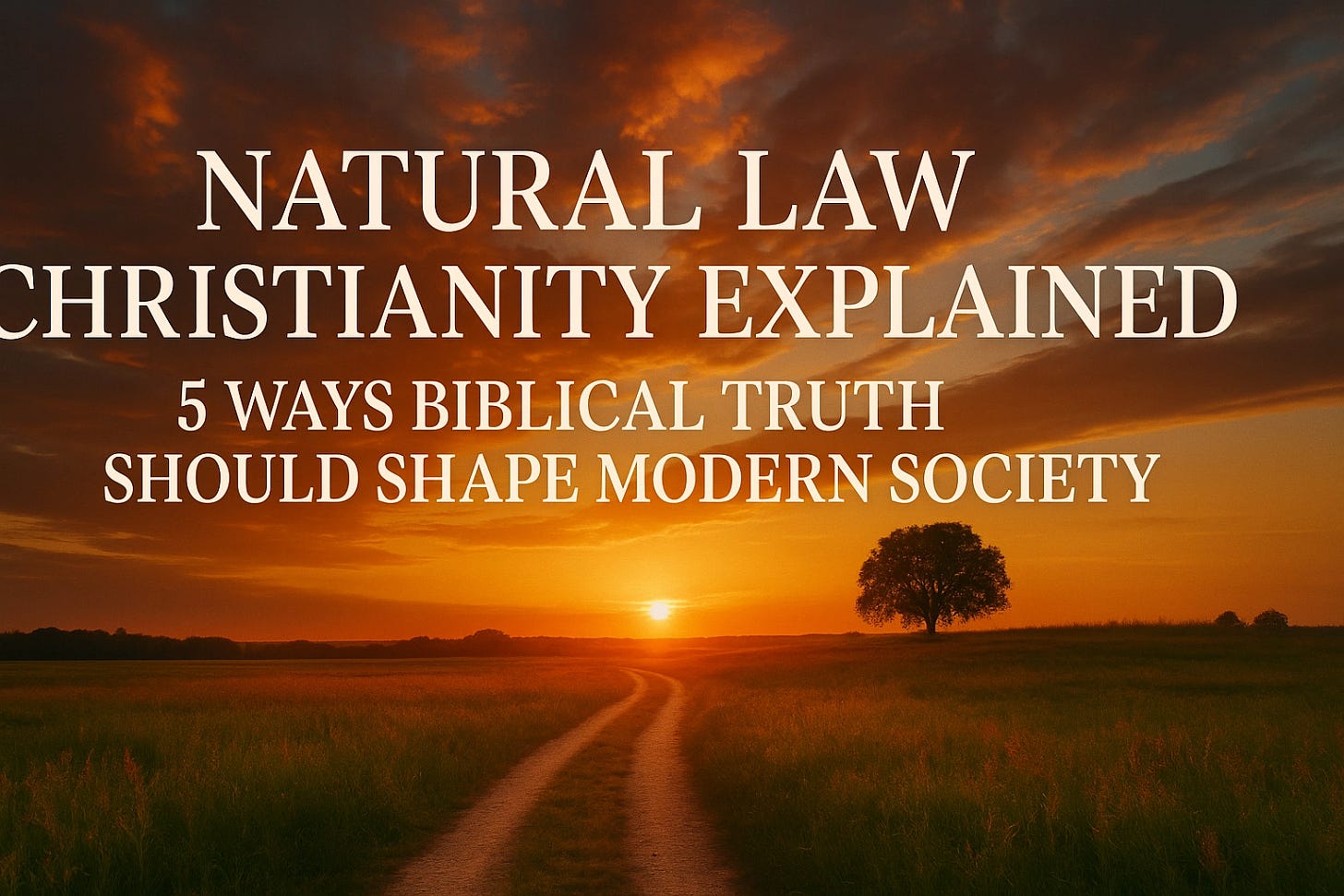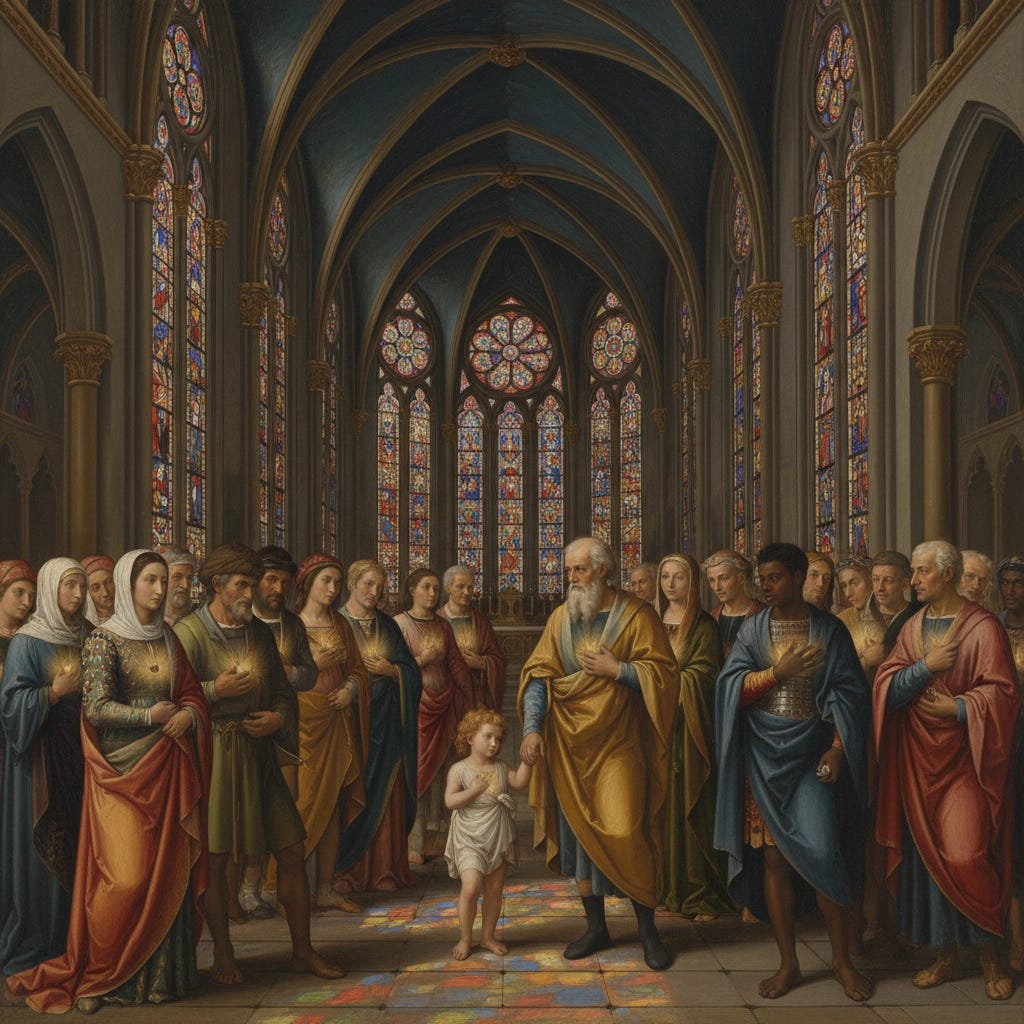Natural Law Christianity Explained
5 Ways Biblical Truth Should Shape Modern Society
Western civilization stands at a crossroads. The moral foundations that sustained democratic societies for centuries crumble beneath the weight of relativism and secular humanism. What once seemed unshakeable: the dignity of human life, the natural family, objective truth itself: now faces systematic assault from those who claim moral authority while rejecting moral law.
This is not accidental. It is the inevitable result of abandoning natural law Christianity.
For nearly two millennia, Christian natural law provided the philosophical bedrock for justice, human rights, and civil society. From the Roman Empire to the American founding, this framework established that moral truth exists independently of human opinion, that reason can discern right from wrong, and that even the most powerful rulers must bow to a higher law.
Today, that framework lies in ruins. The consequences are devastating.
What Is Natural Law Christianity?
Natural law Christianity holds that God has woven fundamental moral principles into the very fabric of creation. These principles operate universally, discoverable through human reason, and binding on all people regardless of their religious beliefs or cultural background.
This is not mere philosophy. This is divine revelation written into reality itself.
Saint Thomas Aquinas crystallized this truth into its most influential form: “Do good and avoid evil.” This supreme principle of natural law requires no formal education, no religious instruction, no cultural transmission. Every person possessing the use of reason knows it intuitively because reason itself reflects the divine image.
The distinction matters profoundly. Positive laws: those created by human authorities: vary by jurisdiction and era. Speed limits change. Tax codes evolve. Immigration policies shift with political winds. But natural law operates eternally, grounded in God’s unchanging character and discoverable across all times, places, and peoples.
Natural law functions on two critical levels. First, it provides principles and conclusions that inform human reasoning about moral conduct. When we instinctively recoil at injustice, when we recognize the wrongness of murder or theft without consulting legal codes, we encounter natural law at work.
Second, natural law reveals profound truths about God’s nature, existence, power, and moral requirements to every human being. The apostle Paul described this phenomenon: “For what can be known about God is plain to them, because God has shown it to them. For his invisible attributes, namely, his eternal power and divine nature, have been clearly perceived, ever since the creation of the world, in the things that have been made” (Romans 1:19-20).
Christ himself represents the fulfillment of natural law. He is “the Way, the Truth, and the Life,” and natural law is ultimately Christotelic: directed toward Christ as its end and completion. This means natural law Christianity doesn’t merely offer abstract moral principles but points toward the living God who became flesh to redeem creation.
Five Ways Biblical Natural Law Should Shape Modern Society
1. Establishing Universal Moral Standards Beyond Political Will
Modern democracy has produced a dangerous delusion: that majority votes create moral truth. Natural law Christianity shatters this illusion completely.
Might does not make right. There exists a higher law defining justice and injustice that transcends political preference, cultural opinion, and executive authority. When the German people elected Hitler, they did not thereby make genocide morally acceptable. When American states legalized slavery, they did not make human bondage righteous. When contemporary societies redefine marriage or authorize the killing of unborn children, they do not alter moral reality.
Natural law provides the transcendent foundation that constrains tyranny and protects vulnerable populations from arbitrary power. It establishes that certain actions remain evil regardless of their popularity, legality, or social acceptance.
This principle offers profound hope in our current chaos. When courts mandate that biological males compete in women’s sports, natural law declares this unjust: not because of religious dogma, but because it violates observable truth about human nature accessible to all reasonable people. When governments restrict parental authority over their children’s education and medical care, natural law provides the framework for resistance based on principles that transcend sectarian disagreement.
2. Limiting Civil Authority Through Transcendent Constraint
The Bible makes clear that civil rulers exist under, not above, moral law. Romans 13 describes governmental authority as God’s servant for justice: but this service requires submission to divine standards, not human whim.
No ruler, however democratically elected, possesses authority to legislate contrary to natural law without inviting divine judgment.
This principle desperately needed revival in modern governance. Contemporary states routinely exercise powers that natural law Christianity explicitly forbids: redefining fundamental moral realities, violating parental rights, compelling speech, and punishing those who hold to traditional moral convictions.
Natural law establishes that governmental power has limits. These limits exist not because human beings created them through constitutions or international treaties, but because God embedded them in the structure of reality itself. When civil authorities exceed these bounds, they forfeit moral legitimacy and citizens possess not merely the right but the duty to resist.
This doesn’t mean anarchy. It means accountability. It means that even elected officials remain subject to transcendent principles that define justice, protect human dignity, and constrain the state’s ability to redefine fundamental goods.
3. Protecting Human Dignity and Equality
Because human reason reflects the divine image, natural law Christianity establishes that all persons possess equal, inalienable dignity that no government can legitimately remove. This principle provides the only secure foundation for universal human rights.
Without natural law, human equality becomes merely sentimental preference. Why should the strong protect the weak? Why should the productive support the dependent? Why should majority populations respect minority rights? Secular frameworks provide no compelling answers because they reduce all moral claims to preference, power, or evolutionary advantage.
Natural law Christianity answers definitively: because every human being bears God’s image and possesses infinite, inherent worth that exists independently of utility, productivity, or social contribution.
This principle speaks urgently to contemporary challenges. It protects the unborn child against utilitarian calculations about burden and convenience. It defends the elderly against cost-benefit analyses about medical care. It shields the disabled from quality-of-life assessments that reduce human worth to functional capability.
It also establishes the moral foundation for opposing racial discrimination, economic exploitation, and systematic oppression: not because these practices violate evolving social norms, but because they assault the divine image present in every person.
4. Providing Common Ground for Public Discourse
One of natural law Christianity’s most practical benefits involves creating shared moral vocabulary accessible to both believers and secular citizens. Rather than reducing all ethical claims to subjective preference or sectarian doctrine, natural law appeals to reason and observable human nature that transcends particular faith traditions.
This enables productive dialogue about public policy even in pluralistic societies. Christians can articulate why certain laws serve the common good using principles that reasonable people across worldviews can recognize and discuss.
Consider the abortion debate. Natural law Christianity doesn’t merely assert that Scripture forbids killing unborn children: though it does. It demonstrates through reason and scientific evidence that human life begins at fertilization, that this life possesses inherent dignity, and that protecting innocent life serves the common good of any society that values justice.
This approach prevents moral conversation from devolving into power struggles between competing interest groups. It provides objective standards for evaluating policies based on their alignment with human flourishing rather than their popularity with particular constituencies.
Natural law Christianity offers the only viable path forward for societies that seek both moral order and religious liberty: establishing transcendent principles that protect fundamental rights while respecting reasonable disagreement about secondary matters.
5. Grounding Social Flourishing in Objective Human Good
Societies that align with natural law experience genuine flourishing. Societies that reject it face inevitable breakdown and dysfunction. This pattern repeats throughout history because natural law reflects the actual conditions required for human happiness and social cohesion.
Natural law is not restrictive but liberating. It reveals how human beings are designed to function within their respective spheres of existence. Just as physical laws enable rather than constrain engineering achievements, moral laws enable rather than constrain human flourishing.
When modern societies ignore natural law principles regarding human sexuality, they experience skyrocketing rates of family breakdown, sexually transmitted disease, and psychological distress. When they abandon natural law regarding economic justice, they produce massive wealth inequality and social unrest. When they reject natural law regarding the protection of life, they create cultures of death that eventually consume their own foundations.
Conversely, societies that structure themselves according to natural law principles experience stable families, economic prosperity, social trust, and genuine happiness. These outcomes occur not because natural law is artificially imposed but because it works with the grain of creation itself.
The evidence surrounds us. Nations that maintain traditional marriage structures show greater social stability. Communities that protect religious liberty demonstrate higher levels of civic engagement. Economies that respect property rights while caring for the vulnerable achieve both prosperity and justice.
The Urgent Call for Restoration
Natural law Christianity offers the only viable path for restoring moral order to Western civilization. It provides transcendent standards that constrain power, protect dignity, enable dialogue, and promote genuine flourishing.
The alternative is barbarism dressed in democratic clothing. When societies abandon natural law, they don’t achieve greater freedom: they create new forms of tyranny that destroy the very foundations of human dignity they claim to protect.
The choice before us is stark: restore natural law Christianity as the foundation for public life, or watch civilization continue its descent into chaos. There is no middle ground. There is no third option.
The time for compromise has passed. The hour demands courage, clarity, and commitment to truth that transcends political convenience.
Will we rise to meet this moment, or will we surrender our children’s future to the architects of moral anarchy? The answer will determine not merely the fate of nations but the legacy of Christian civilization itself.






